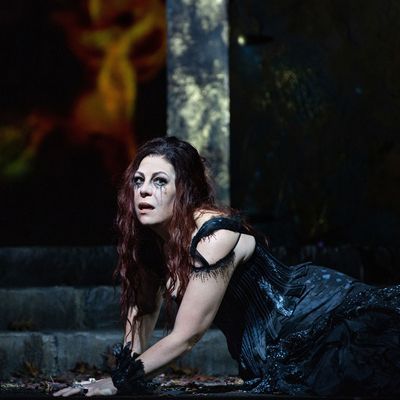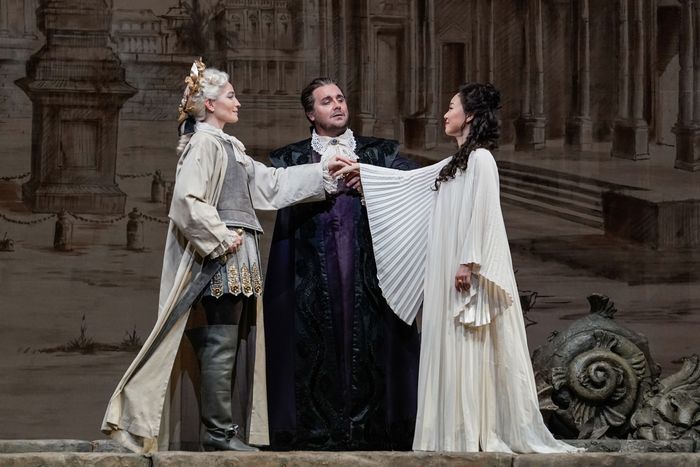
Sondra Radvanovsky opened the season by singing the title role in Sondra Radvanovsky’s production of Sondra Radvanovsky’s Medea in the Sondra Radvanovsky Opera House. Technically, that’s not an accurate description, since Luigi Cherubini composed the score, David McVicar directed, and the performance, conducted by Carlo Rizzi, took place at the Met. But if the company finally got around to mounting a 1797 opera for the first time, it’s as a showcase for the soprano, who sells it virtually singlehandedly with tempered voice and controlled ferocity. In theory, it’s not a one-woman show. Matthew Polenzani supplies splendid indignation as Medea’s disenchanted ex, Giasone (he of the Golden Fleece), Ekaterina Gubanova does fine work as Neris, and Michele Pertusi thunders admirably as the king, Creonte. But even these high beams go wan in Radvanovsky’s sunlight.
It takes a long time for Medea to show up to her own opera, and in the meantime, the work chugs along in a protracted bout of exposition, propelled by a score of dark dramatic charms. Beethoven admired Cherubini’s music, presumably for its narrative drive and the vividness of his orchestration, but Rizzi seems to have had trouble getting the Met orchestra to buy into that assessment — the first 45 minutes are short on sharpness, savagery, or foreboding. (Or at least they were on opening night.)
Finally, the spurned sorceress makes her entrance, shedding notes like flaming cinders. This is an opera about anger, which makes it perpetually timely and doubly so now, when rage hardens all political positions and undergirds all public conversations. The reasons for the emotion hardly matter. Medea’s response to her former lover’s disdain is awesomely disproportionate, but then humans have similarly violent reactions to a whole range of disappointments, from electoral corruption (real and perceived) and racial injustice to a missing condiment on a takeout order. Her impulses are ordinary; what makes her an opera character is her refusal to control them. The intensity of her lust for destruction lies at the Putinesque end of the spectrum.
It’s one thing to point out these internal conflicts; it’s another to get them across onstage, as Radvanovsky mostly does. Blessed with a strong and flexible body to go with her strong and flexible voice, she performs some standard opera-singer histrionics, plus extra-vigorous writhing and a good deal of supine singing. Unwisely, McVicar has her extract a dagger from a wooden chest and brandish it aloft in cab-hailing position—twice. But if all that extreme acting borders on the silly, it’s partly because she delivers so much character development with her voice alone that she could be seated in a pew and still convey her wildness. Radvanovsky can slide from the bottom to the top of her range along her titanium wire of a soprano, ductile and iridescent. But when the character’s emotional extremes demand it, she can produce a light little coo that suggests creepy girlishness or drop into a masculine foghorn, the sound of vindictive wrath. All that controlled variety makes Medea’s caroming from doting to bloodlust sounds like someone whose psyche has become a battlefield between her two personalities.
McVicar doubles down on the doubling. All the action takes place in front of an immense mirror, tilted to provide a drone’s-eye reflection of the stage. It’s a sporadically effective trick, and McVicar works hard to keep it fresh. Act III opens with Medea lying on the stage and centered in the mirror. Even before she begins to summon the spirits to enact her vengeance, we see her as if suspended in midair, encircled by projected clouds, like a figure in a frescoed ceiling. Later, she marches into the pre-ruined temple, disappearing behind great bronze doors that are mottled and patinated as if they had already been subjected to a scorching. As the act heats up and flames break out in shades of Götterdämerung, it’s Radvanovsky again who inhabits the set, elevates the score, and refines primal instincts into thrilling spectacle. She and her character make sure that their joint exit is all-consuming. I sympathize with the poor soprano who stands ready to to step in should the sorceress get a cold.
The Met followed one 18th century opera based on a blood-soaked Greek myth with a second: Mozart’s Idomeneo, in a decades-old but still stylish production by Jean-Pierre Ponelle. If the former is a star vehicle, the latter is the quintessential ensemble opera, an ultimately optimistic journey through misery and loss in which love wins out over vengeance. Soprano Ying Fang sings the princess prisoner Ilia with lovely sobriety, caressing each phrase as if her sorrow were a precious object. Mezzo-soprano Kate Lindsey responds with similar grace as the dauphin Idamante, and Michael Spyres, despite some occasional high-range struggles, sang the title role with a ringing, big-chested tenor, moderated by tenderness and a velvety pianissimo.
From the first notes, the conductor Manfred Honeck, making an unbelievably delayed Met debut, does justice to the crackle and elegance of Mozart’s score. The characters speak of murder, human sacrifice, drowning, and other forms of destruction, and Honeck nurtures that undercurrent of violence. But over that craggy foundation, he drapes phrasing of such polish, nuance, and romantic refinement that no listener can doubt how the contest between the primal and the civilized will end.






